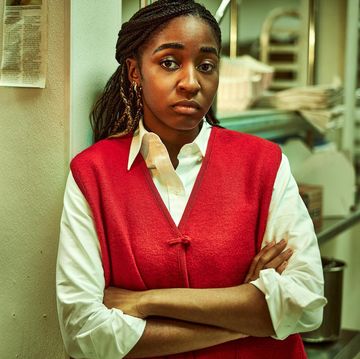Ryan Coogler’s Sinners is having a moment, and the film has sparked a resurgence of the Black vampire in pop culture. Embodied first by Jacqueline Sieger's Reine des Vampires and William Marshall's legendary Blacula (née Prince Mamuwalde), and more recently by Jacob Anderson's Louis de Pointe du La (in Interview with the Vampire) and Elarica Johnson's Drolta Tzuentes (in Castlevania: Nocturne), the Black vampire's presence on screen has always been subversive. It's a defiance drenched in blood. Whether you’re a tried-and-true devotee of the horror genre or susceptible to jump scares and gore, bearing witness to the monstrous power of the Black vampire is an invitation to a revolution. Thankfully, Coogler’s vamps aren’t alone—they’re a part of a decades old canon of creatures of the night who continue to compel and provoke.
La Viol du Vampire (1968)
Long before Aaliyah's Akasha became an immortal icon, Jacqueline Sieger ruled the night as Queen of the Vampires in Le Viol du Vampire. Jean Rollin's timeless homage to the bloodthirsty begins with a psychiatrist's descent into darkness when he attempts to "heal" a would-be coven of fanged young women living in a remote chateau. A cult classic in its own rite, Rollins’s debut feels revelatory in part due to Sieger’s presence. Much like Ben (Duane Jones) in George Romero's Night of the Living Dead, Sieger's Queen is satisfyingly subversive and brazen. Watching her shamelessly wield a blood-soaked blade and bare her teeth feels like a gift, a foretelling.
Blacula (1972) / Scream Blacula Scream (1973)
A beloved Blaxploitation masterpiece, William Crane's Blacula and its subsequent sequel—Scream Blacula Scream—begins in Transylvania with Prince Mamuwalde's (portrayed by William Marshall) plea for Count Dracula's help to combat the slave traders invading the shores of his kingdom. Dracula refuses, tempers rise, and Mamuwalde's mortality gives way to eternal night after he is bitten, damned, and renamed by the notoriously vindictive Count. He remains trapped in his crypt until his slumber is disturbed by a pair of LA interior designers who acquire his coffin in 1972. Once awakened, Blacula's bloodthirst prevails, the body count grows, and his sired minions stalk the streets. Blacula's impact on the genre is undeniable, but what makes Crain's vampire prince truly eternal is his capacity to feel, whether it be love, vengeance, or even grief. As a member of the undead, his carnage isn’t merely a symptom of his appetite—it’s a form of resistance.
Ganja and Hess (1973)
Bill Gunn's iconic film follows anthropologist, Dr. Hess Green (Duane Jones) as he battles the onset of bloodlust after getting wounded by an ancient dagger wielded by his vampiric assistant (Gunn himself). When Hess's assistant's estranged partner Ganja (Marlene Clark) arrives at his doorstep, passion gives way to immortality. As portrayed via Gunn's cinematic vision (which was later reimagined by Spike Lee's 2014 Da Sweet Blood of Jesus), the films’ titular vampires are grippingly existential and complex. Their journey paints an evocative portrait of a post-colonial reckoning.
Vampira (1974)
A comedic riff on a familiar trope, this '70s romp pairs Teresa Graves (Countess Vampira) with David Niven (Count Dracula). When Count Dracula's plan to resurrect his wife (which includes a transfusion using the blood of a Black Playboy Playmate) goes awry, his beloved reawakens as a Black woman. The aftermath of this unexpected result is a surprisingly satirical, if dated, exploration of racial identity, sexuality, and desire. Despite its over reliance on one-liners and a predictable plot, the movie is saved by Graves's unapologetically rebellious Vampira, who is a force to be reckoned with. Her performance adds depth to an otherwise forgettable spoof.
The Midnight Hour (1986)
This ABC made-for-TV wonder unfolds on All Hallow's Eve in small town in Massachusetts. While in search of authentic costumes for their Halloween party, a group of teens (including Shari Belafonte-Harper as Melissa Cavender and LaVar Burton as Vinnie Davis) unknowingly awaken an ancient curse that brings the dead to life, including an ancient ancestor (played by Jonelle Allen as Lucinda Cavender). Through the teens, something new is conjured, and as the midnight jour advances, each vamp revels in the fullness of their power—for survival, for joy, and for passion. That along, with a memorable moment in a wine-soaked cellar and a synth-drenched synchronized dance, make this film a deserving '80s classic.
Vamp (1986)
What begins as a frat-ordained mission for three undergrads quickly shifts into something deeper, something timeless thanks to Grace Jones who portrays Katrina, a vampiric performer at strip club coyly named After Dark. Katrina’s act feels equal parts camp and conceptual, imbued with a perhaps unintended subtext for the filmmakers enriched by Jones’s depth and awareness of the gaze of onlookers (in the form of the camera and the audience—fictive and real). As she moves across the stage, her eyes blue and her body covered in glyphs (painted by Keith Haring), it becomes clear that Jones is aware of not just Katrina’s power, but her own.
Fright Night 2 (1988)
In this 1989 addition to the Fright Night franchise, the film follows would-be hero Charley as he attempts to balance college life with the lingering trauma of what he's survived. When Charley crosses paths with the vampire Regine, things get complicated, and the bodies start to pile up. Belle (Russell Clarke), one of the vamps in Regine's brood, contributes to the bloodshed with undeniable finesse. Dressed like a New Romantic meets Sylvester circa Sell My Soul, Belle makes kills that feel like an art form in motion (on roller skates, no less). Celebrated as a queer vampiric rebel, Belle is a patron saint for Black outsiders past and present.
Def by Temptation (1990)
Joel (James Bond III), a man of the cloth, grapples with the faith of his youth as he visits K—a childhood friend—in New York City. During his time in the city that never sleeps, both K and Joel fall under the spell of the Temptress (Cynthia Bond). A vigilante of sorts, the Temptress is both a succubus and a reckoning. Although her hands might be covered in blood and viscera, there is a karmic intentionality to her kills. It may not have been intended by her creators, but the Temptress is an abject hero, fangs and all.
Vampire in Brooklyn (1995)
Wes Craven's bloody romcom follows detective Rita Veder (Angela Bassett) as she navigates the aftermath of her mother's passing and investigates a bizarre string of murders. While on the beat, she crosses paths with the supernaturally suave Maximillian (Eddie Murphy) and yup, you guessed it, he's a vampire. What ensues is a battle for Rita's mortality, a blurring of the line between desire and fear, and a rebirth. There are so many things that make Bassett and Murphy's performances memorable, but one of the most striking aspects of this film is its nuanced depiction of grief, the search for belonging, and survival in the wake of loss.
The Transfiguration (2016)
While the latter '90s and early aughts gave birth to the day-walker Blade (Wesley Snipes) and the heart-crushing mother of all vampires Akasha (Aalyiah), 2016’s vampiric bildungsroman The Transfiguration offers viewers something different. Centered on Milo (Eric Ruffin), a teenage boy obsessed with vampiric lore, the film portrays the dangers of fantasy and escapism. Caught between reality and fiction, Milo’s fascination with the macabre is symptomatic of his inability to escape the systemic pressures of his mortal life. For this young protagonist, being undead is a form of freedom, a blood-singed hope.
Suicide by Sunlight (2020)
Nikyatu Jusu's short follows Valentina, a vampire whose melanin allows her to walk in daylight. Since she's able to survive in sunlight, Valentina splits her time between her day job as a dedicated pediatric nurse and satiating her hunger for blood at night. As she navigates this delicate balance between healing (as a nurse) and harm (as a vampire), Valentina also struggles to repair her relationship with her estranged daughter and former partner. Like Jusu's directorial debut feature Nanny, Valentina's journey is equally shaped by strength and vulnerability.



















